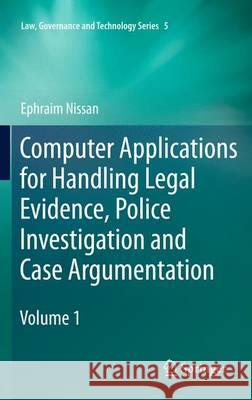Computer Applications for Handling Legal Evidence, Police Investigation and Case Argumentation » książka
Computer Applications for Handling Legal Evidence, Police Investigation and Case Argumentation
ISBN-13: 9789048189892 / Angielski / Twarda / 2012 / 1340 str.
This book provides an overview of computer techniques and tools for handling legal evidence, police intelligence, crime analysis or detection, and forensic testing, with a foray into the modelling of argumentation and its application to these. Notwithstanding a few seminal precursors from the late 1980s, it is only with the new century that the modelling of reasoning on legal evidence has emerged as a significant area within the well-established field of AI & Law (active since the 1970s). An overview such as this one has never been attempted before. It offers a panoramic view of topics, techniques and tools. It is intended to clarify the broader picture for the specialist, as well as to introduce practitioners of AI into this subject. For its newcomers, it is essential not to simplistically blunder into such design choices that would results in flaws making the tools unusable by legal professionals, so it is important to be aware of ongoing controversies. Other tools are appropriate for law enforcement, e.g., tools assisting in crime analysis. In order to deal with hypotheses, representations and tools for the organization of arguments are useful; therefore, research into argumentation is cited, and argumentation tools or methods that are useful for reasoning about the evidence are surveyed. Appendix A analyses a sample invented, yet articulate case, and provides a Wigmore Chart for its arguments. Appendix B consists of an extensive glossary, being a useful resource for the subjects covered in this book. In several of this book's chapters, we foray into specialist forensic disciplines (forensic archaeology, anthropology, geophysics, face reconstruction, environmental forensics, and the determination of authorship), because computer techniques are useful in these, too. We also briefly address costs and benefits of obtaining more evidence while preparing a case, as a factor in deciding whether to prosecute or to litigate.











